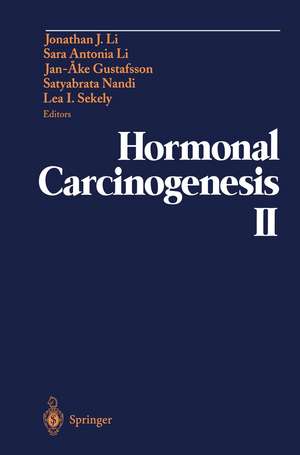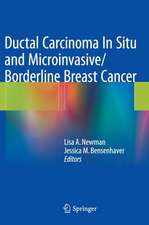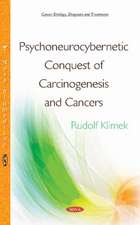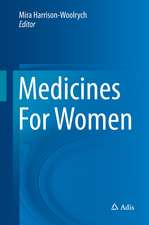Hormonal Carcinogenesis II: Proceedings of the Second International Symposium
Editat de Jonathan J. Li, Sara A. Li, Jan-Ake Gustafsson, Satyabrata Nandi, Lea I. Sekelyen Limba Engleză Paperback – 5 oct 2011
Preț: 382.43 lei
Preț vechi: 402.56 lei
-5% Nou
Puncte Express: 574
Preț estimativ în valută:
73.18€ • 76.76$ • 60.92£
73.18€ • 76.76$ • 60.92£
Carte tipărită la comandă
Livrare economică 01-15 aprilie
Preluare comenzi: 021 569.72.76
Specificații
ISBN-13: 9781461275060
ISBN-10: 1461275067
Pagini: 548
Ilustrații: 500 p.
Dimensiuni: 155 x 235 x 29 mm
Greutate: 0.76 kg
Ediția:Softcover reprint of the original 1st ed. 1996
Editura: Springer
Colecția Springer
Locul publicării:New York, NY, United States
ISBN-10: 1461275067
Pagini: 548
Ilustrații: 500 p.
Dimensiuni: 155 x 235 x 29 mm
Greutate: 0.76 kg
Ediția:Softcover reprint of the original 1st ed. 1996
Editura: Springer
Colecția Springer
Locul publicării:New York, NY, United States
Public țintă
ResearchCuprins
Introductions.- Introductory Remarks.- Opening Address Important Questions in Women’s Health Research: Determining the Influence of Hormones on Health.- Symposium Presentations Mammary Carcinogenesis: A Unifying Hypothesis.- Regulation of Cytochrome P-450 and Carcinogenesis: Peroxisome Proliferator-Activated Receptor and Dioxin Receptor.- State Of The Art Lectures.- 1 Cell Cycle and Cell Proliferation.- 2 Role of a Cell Cycle Regulator in Hereditary and Sporadic Cancers.- 3 Molecular Cytogenetics of Solid Tumor Progression.- 4 Nucleocytoplasmic Shuttling of Estrogen Receptors Is Blocked by “Pure Antiestrogens”.- I. Epidemiology: Hormonal Cancers.- Causality in Hormone Associated Human Cancers.- 5 Breast Cancer Incidence in Women Exposed to Estrogen and Estrogen-Progestin Replacement Therapy.- 6 Breast Cancer Trends in Women in Sweden, the UK, and the USA in Relation to Their Past Use of Oral Contraceptives.- 7 Gene Expression in Familial Breast Cancer: A Genetic-Epidemiology Study of Premenopausal, Bilateral Breast Cancer.- 2. Breast/Mammary Gland.- The Importance of Human Breast Development in Mammary Carcinogenesis.- 8 Breast Susceptibility to Carcinogenesis.- 9 Hormones, Growth Factors and Gene Expression in Preneoplasias of the Mouse Mammary Gland.- 10 Pathogenesis of Ductal and Lobular Progestin-Induced Mammary Carcinomas in BALB/c Mice.- 3. Endometrium/Uterus.- 11 Is the hsp90 Connection Between Steroid Receptors and Immunosuppressant Binding Immunophilins Involved in the Control of Gene Transcription and Cell Growth?.- 12 Expression and Regulation of 17?-Hydroxysteroid Dehydrogenase Type 1 in Steroidogenic Cells and Estrogen Target Tissues.- Growth Factors in Endometrial Cancer.- 4. Kidney.- 13 Introduction Estrogens and Genitourinary Cancers of Syrian Hamsters.- 14 Interstitial Cell Origin of Estrogen-Induced Kidney Tumors in the Syrian Golden Hamster.- 15 Effects of Estrogens on Microtubule Assembly: Significance for Aneuploidy.- 16 Estrogen Carcinogenesis: A Sequential, Epi-Genotoxic, Multi-Stage Process.- 5. Liver.- Role of Estrogens in Liver Carcinogenesis.- 17 Hormonal Regulation of Hepatic Cell Proliferation and Apoptosis: Implications for Carcinogenesis.- 18 Mechanisms of Tamoxifen-Induced Genotoxicity and Carcinogenicity.- 19 Regulation of Growth-Associated Nuclear Transcription Factors During Growth Hormone-Regulated, Sex Differentiated Rat Liver Carcinogenesis.- 6. Prostate.- 20 Isolation of Differentially Expressed cDNAs from Prostate Cancer Cell Lines Using Differential Display PCR: Identification of an Androgen-Regulated Gene.- 21 Progression of LNCaP Human Prostate Carcinoma Cells: Androgen Receptor Activity and c-myc Gene.- 22 Regulation of Prostatic Growth and Gene Expression: Role of Stroma.- Concluding Remarks.- 23 Sex Hormones and Neoplastic Transformation.- CLINICAL FORUM: Risk and Benefits of Hormone Replacement Therapy and Oral Contraceptive Use.- Therapeutic Implications of Hormone Replacement Therapy and Oral Contraceptives.- 24 Postmenopausal Estrogen-Progestin Therapy in Relation to Cancers of the Endometrium and Breast.- 25 The Use of Hormone Replacement Therapy in Women Previously Treated for Breast Cancer.- 26 Cardioprotection by Hormone Replacement Therapy.- 27 Risk and Benefits of Oral Contraceptives.- 28 Oral Contraceptives and the Risk of Breast and Cervical Cancer.- Communications Session I. Epidemiology, Human Studies.- Some Aspects of Breast Cancer Epidemiology.- Risk of Breast Cancer Associated with Induced Abortion.- Family History of Breast Cancer as a Modifier of Other Risk Factors.- Oral Contraceptive Use and Reproductive Risk Factors for Breast Cancer: A Comparison of Results among Black and White Women.- Patterns of Cancer Mortality in Women Who Had Used Sex Steroid Hormones under Age 60.- Progestogen Use and Risk of Breast Cancer.- Five-Year Survival of Women with Breast Cancer According to Prior Use of Oral Contraceptives.- Plasma Prolactin and IGF-1 Levels in Young, Healthy, Nulliparous Women in Relation to Low Dose Oral Contraceptive Use.- Effect of a Low-Fat Diet on Estrogen and Bile Acid Metabolism in Normal Human Subjects.- Expression of GST? in Breast Cancer and its Relationship with the Expression of Estrogen Receptor and Progesterone Receptor.- p53 and Neu (c-erbB-2) Overexpression in Relation to Risk Factors for Breast Cancer.- Cost Effectiveness of Hormone Replacement Therapy in French Postmenopausal Women.- Tamoxifen Treatment Does Not Induce Endometrial Hyperplasia in Postmenopausal Women.- Uterine Myomas: A Model to Study Hormonal Regulation of Growth Related Genes.- Transforming Growth Factor ?1 Facilitates Cell Proliferation and Invasion in MAT-LyLu Prostatic Cancer Cells.- Quantitative Effects of Antiandrogen Therapy on High-Grade Prostatic Intraepithelial Neoplasia in Radical Prostatectomy Specimens.- Alterations in Circulating Levels of Androgens and PSA During Treatment with Finasteride in Men at High Risk for Prostate Cancer.- Session II. Cell & Molecular Biology, Metabolism.- Effect of Estradiol on MCF-7 Human Breast Cancer Cells: Ultrastructural Studies.- Estradiol and Tamoxifen Induce TGF-?l Gene Expression in Cultured Normal Human Breast Stromal Cells.- Estrogen and Anti-Estrogen Regulation of Amplified erbB2 Gene Expression in Human Breast Cancer Cells.- Evaluation of Conformational Changes in hER-HBD by Pharmacological Dissection of Hormone Dissociation Rates in a Homogeneous Hormone-Binding Assay.- Estradiol Promotion of Size and Number of Hepatic Enzyme-Altered Foci in Rats in the Absence of Cell Proliferation.- Expression of Liver-Enriched Transcription Factors During Progression in the Resistant-Hepatocyte Model.- Nuclear Protein Binding to the AP-1 and CRE Sites During Sex-Differentiated Promotion of Rat Liver Carcinogenesis.- Induction of Endometrial Cancer by Tamoxifen in the Rat.- Mechanisms of Anti-Estrogen and Retinoid Inhibition of Breast Cancer Cell Proliferation.- Bisphenol-A Disturbs Microtubule Assembly and Induces Micronuclei In Vitro.- Natural Estrogens Induce Modulation of Microtubules in Chinese Hamster V79 Cells in Culture.- Induction of Micronucleation, Spindle Disturbances, and Mitotic Arrest in Human Chorionic Villi Cells by 17?-Estradiol, Diethylstilbestrol, and Coumestrol.- Increased Nuclear IGF-I Receptor Level, Coupled with Attenuation in DNA Repair, Plays an Important Role in Estrogen-Induced Carcinogenesis.- Pattern of Reproductive Aging in Female Rats Can Affect Mammary Tumor Incidence.- Antiproliferative Activity of Luteolin, a Naturally-Occurring Edible Plant Flavone, Against Estrone-Induced Cell Proliferation in the Mammary Gland of Noble Rats.- Sex Hormone-Induced Prostatic Carcinogenesis in Noble Rats Involves Genetic Damage and Cell Proliferation.- Catechol Estrogen Analogs as Probes of Estrogen Carcinogenesis.- In-Vitro Metabolites of Coumestrol.










